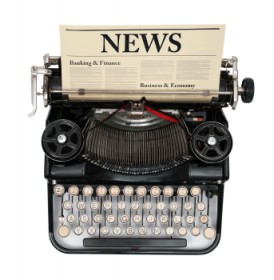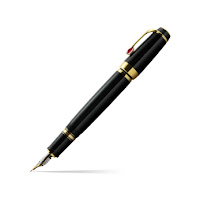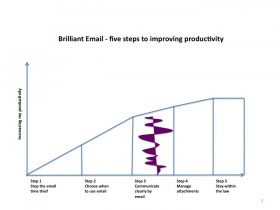As the last typewriter rolls off the production line I am filled with sadness. I loved the clatter of the keys and the whiz of the carriage as you pushed it across. Here is a wonderful video for those who yearn after these sounds which to me equalled creativity and thinking. There was little scope for making errors unless you wanted either to type the whole page again or cover yourself in Snowpake corrector fluid. You had to plan what was to be typed before hitting the keys.
I blame the demise of the typewriter on the insidious rise in Cc’d email and hence email overload. In the era of the typewriter you could only make a limited number of carbon copies. Typing a memo therefore did not give you the option to flood  everyone’s in-tray (inbox) with trivial memos and replies and counter replies.
everyone’s in-tray (inbox) with trivial memos and replies and counter replies.
The effort of typing a reply also meant you used your time carefully and again cosidered what was to be said and how it should be laid out. You also thought hard about the length of the memo (unless you could touch type). The death of the typewriter may therefore also be partly to blame for the often appalling level of grammar and English we now witness in electronic communications, not to mention bad email etiquette.
Then there is RSI. Did anyone ever complain of it with a typewriter? No. Did you need to be connected to use one? No. Did you need to upgrade every year or so? No. Your portable typewriter was like a faithful companion, always there ready to go and help you produce that new column, manuscript, letter etc.
There have been several obituaries to the typewriter amongst my favorites of which are Oh Brother, where are thou? by Will Self in The Times and Typewriter’s block in the Financial Times.
What do you miss about the typewriter?
Tags: cc'd email, email etiquette, email overload, RSI, typewriter
The latest Ofcom report revealed that we now use our mobile phone more for sending text messages, email and social networking than for talking. How very very sad. This data presumably based on social communications is mirrored by how we communicate at work. Choosing the wrong communications media is often one of the major causes of email overload.
Go into any office and all you hear is the clatter of the keyboard. Nobody talks any more. Gone is art of conversation. Text and email are lean thin communications channels devoid of all emotions and feeling. Moreover they are blinkered and present tunnel vision as discussed in a previous blog.
 |
| Ways to communicate effectivley from ‘Brilliant Email’ by Monica Seeley |
You miss the opportunity to pick up all that extra rich information and gossip, for example what other project the client is working on, who is about to be fired, potential budget cuts. When you talk (face to face or by phone you can sense from the tone and facial expression how the other person is feeling. This additional information is as I was taught key to developing the client relationship (and indeed any relationship).
Email is often the cover up for much deeper problems a point made by Lucy Kellaway in her ‘Dear Lucy’ column today.
The Ofcom report highlighted the increasing use of mobile phones for social networking above talking. Is it little wonder that a recent CBI report found many young people lacked adequate business communications skills.
There is a time and place for text messaging. It is great for short ephemeral messages eg train delayed. However we must remember it is only a messaging systems not a full blown rich communications medium.
Your goal should always be ‘right message right first time and especially if you want to improve business relationships and as a spin off reduce information and email overload.
Tags: email etiquette, email overload
A basic level of literacy is fundamental to business and not least using email. The recent survey by the CBI and others reveals that a fifth of organisations now provide extra literacy training. Moreover the level of literacy has fallen over the past decade.
This mirrors Mesmo Consultancy’s own experience: – teaching Generation Y and the Millennial how to write a proper email is a key priority for most workshop sponsors.
 |
| An aid to better email etiquette? |
Clearly our eduction system has something to answer for, but is Facebook and the like also part of the problem? Social media enables us to writing quick often slap dash posts with no reference to grammar and spelling. Many then feel they can carry such standards over in to business and their email etiquette. Whereas traditional writing instruments force one to think before commiting to paper. After all who wants to send a letter/card with lots of deletions and messy crossing outs.
Poor email etiquette can be very costly – see previous blogs and articles.
We have produced a short free email literacy checklist to help people quality check their emails before hitting send.
It took me several goes to pass my English O’Level (as it was in those days). It was a pre-requirement for University entrance even though I was to study Chemistry. Modern spell and grammar checkers help but they do not spot the nuances between say ‘there’ and ‘their’ or where to put the apostrophe. My bible is Lynne Truss’s wonderful book ‘Eats Shoots & Leaves’. Perhaps a copy should be given to every school leaver?
This week’s EmailDoctor tweets will highlight some recent email etiquette howlers which have turned up in my inbox.
Dr Monica Seeley, founder of Mesmo Consultancy has spent the last fifteen years coaching and training people from a wide range of organisations and businesses to use email more effectively to improve personal and business performance. She is passionate about helping people save time by using email effectively and has written several books on the subject, the latest being Brilliant Email. She runs regular workshops and masterclasses on email best practice.
Tags: corporate email etiquette, email etiquette, email etiquette dos and don'ts, email etiquette training
Its Green Office Week this week and stopping email overload is one way to make a very significant contribution to reducing your carbon foot print.
 |
| Green Email Usage |
If your office and desk space was awash with papers you wouldn’t just go and ask for a new desk/larger office. You would be forced to clear up. Yet with email most people tend to ignore the warnings about mailbox sizes. Old emails are simply moved to another destination (for Outlook users often a pst file) and the inbox allowed to overflow again.
Unlike paper we can not see our emails, but make no mistake the more emails the more energy needed to process them. Even if you opt for email archiving to reduce the storage requirements, servers and energy is still needed to process them.
The main suppliers of email like Google, Microsoft and BT all promote large inboxes as an advantage. In my book this is amoral as it increases our carbon foot print and encourgaes email overload. It’s akin to the banks lending to people who could not aford to repay the loan. Instead of promoting bloated inboxes, responsible email providers should be promoting and rewarding those who downsize and maintain small sustainable inboxes.
Many business are now downsizing their office space to reduce overheads and be more sustainable. We should be doing the same with email to reduce our carbon foot prints. For example, reduce the volume of traffic through our inbox by reducing the number of emails chains, better email etiquette, sharing rather than sending the complete file.
During the week I will tweet more tips on how going green can also help you stop email overload.
Tags: BT, email chains, email etiquette, email overload, empty inbox, green office week, Microsoft
 |
| From Brilliant Email by Monica Seeley, Pearson, 2010 |
Can email etiquette help stop email overload and enable you to reach inbox zero status? In my book Brilliant Email, email etiquette is identified as step 3 for improving productivity – see diagram opposite.
Like any form of communication, it is about conveying the right message right first time and know when to stop the conversation and move on. In a previous blog I wrote about the importance of good grammar and spelling.
How often in an email do we leave ourselves open for the recipient to send a reply which adds little or nothing to the communication but means that out of courtesy we must reply again?
Take a look at the email chains in your inbox and I’ll bet you have quite a few which could have been terminated much earlier. For example, when you ask someone for information, to do something etc. There are often two or three quite unnecessary rounds of email ping pong as you each play what I call the ’email thank you game’.
Recipient – Yes OK will do.
Sender – Thank you.
Recipient – That’s OK.
Sender – By the way can it be done by 12.00 noon?
Recipient – Yes.
Sender – Thanks.
Etiquette suggest that we say thank you. But how about using brilliant email etiquette to reduce the number of rounds of the email thank you game and hence stop email overload.
Here is what I would say in my email as the sender.
Sender – Please can you do X and if possible by noon today. Many thanks for your help.
Recipient – Yes.
End of the email chain and a chance to reach inbox zero status more quickly.
For more ways to save time and reduce email overload by using an alternative medium why not come on one of our Brilliant Email masterclasses or webinars?
What email etiquette do you use to be courteous yet reduce the rounds of the email thank you game?
Tags: email communications, email etiquette, email overload, inbox zero